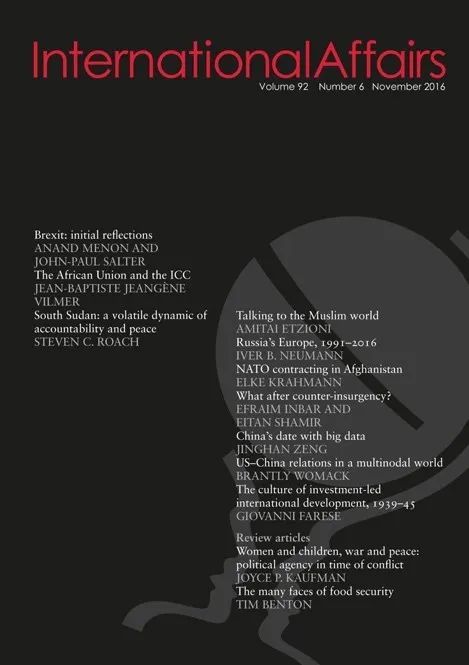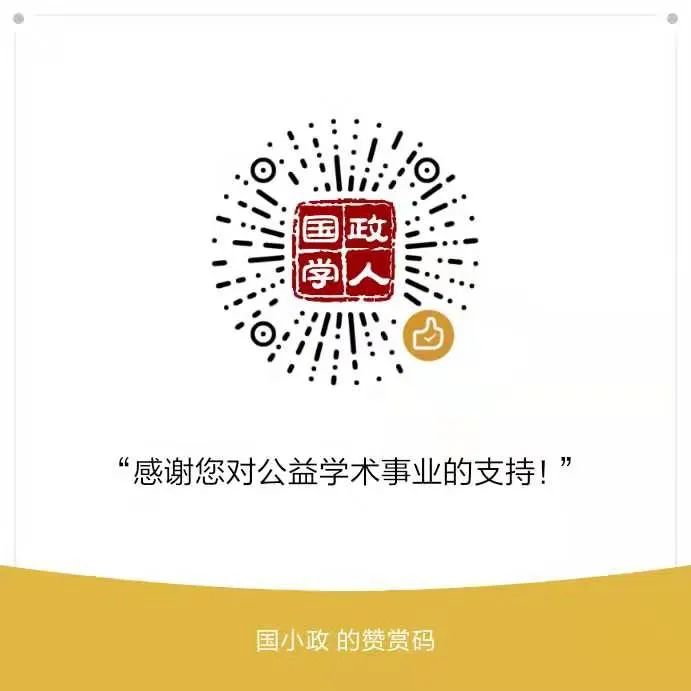【新刊速递】第29期 | International Affairs, Vol. 96, No.2, 2020





本期编委
【编译】许文婷 赵雷 吴皓玥 施榕 扎西旺姆
【校对】李玉婷
【审核】周玫琳
【排版】贺奕
本期目录
解读宗教在政治跨国主义中的角色:以2003年以来的伊拉克什叶派流散人口为例
【题目】Unpacking the role of religion in political transnationalism: the case of the Shi’a Iraqi diaspora since 2003
【作者】Oula Kadhum,伦敦大学亚非学院教员,伯明翰大学博士后研究员。研究兴趣为欧洲和中东之间的侨民政治和跨国主义。
【摘要】本文以2003年以来伊拉克什叶派流散人口为例,探究宗教在政治跨国主义中的角色。本文重点介绍三个领域,这些领域把握了什叶派跨国主义的重要趋势及其对跨国什叶派身份政治的影响。它们包括什叶派流散政治、跨国什叶派公民行动主义和通过朝圣、仪式和新的实践形成的作为文化产物的伊拉克什叶派身份。了解什叶派伊斯兰教及其身份形成需要采用跨国的视角。什叶派伊斯兰教的演变不仅是什叶派教派中心的指令及其对海外什叶派人口影响的结果,同时也是与圣城、什叶派国内和国际政治、人道主义、庆典与仪式的跨国相互作用和联系的产物。本文表明,什叶派政治跨国主义有不特殊的一面,因为它呼应了许多关于流散政治和发展的文献,其中流亡者从远方参与其原籍国的政治和社会。同时,本文也表明了什叶派流亡运动的特殊性,因为其动机和动员有助于教派地理边界和社会边界的统一,从而形成了一个大部分由什叶派构成的网络、空间、参与者和事业所定义的跨国主义。伊拉克什叶派政治跨国主义的案例表明,它正在扩大什叶派与伊拉克其他社区之间的距离,一边分裂伊拉克的民族团结,一边在国家和超国家层面深化什叶派的身份和政治。
This article explores the role of religion in political transnationalism using the case of the Shi’a Iraqi diaspora since 2003. The article focuses on three areas that capture important trends in Shi’a transnationalism and their implications for transnational Shi’a identity politics. These include Shi’a diasporic politics, transnational Shi’a civic activism, and the cultural production of Iraqi Shi’a identity through pilgrimages, rituals and new practices. It is argued that understanding Shi’a Islam and identity formation requires adopting a transnational lens. The evolution of Shi’a Islam is not only a result of the dictates of the Shi’a clerical centres, and how they influence Shi’a populations abroad, but also the transnational interrelationships and links to holy shrine cities, Shi’i national and international politics, humanitarianism and commemorations and rituals. The article demonstrates that Shi’a political transnationalism is unexceptional in that it echoes much of the literature on diasporic politics and development where diaspora involve themselves from afar in the politics and societies of their countries of origin. At the same time, it shows the exceptionalism of Shi’a diasporic movements, in that their motivations and mobilizations are contributing to the reification of sectarian geographical and social borders, creating a transnationalism that is defined by largely Shi’a networks, spaces, actors and causes. The case of Shi’a political transnationalism towards Iraq shows that this is increasing the distance between Shi’is and Iraq’s other communities, simultaneously fragmenting Iraq’s national unity while deepening Shi’a identity and politics both nationally and supra-nationally.
【编译】许文婷
【校对】李玉婷
不成熟的领导:唐纳德·特朗普和美国总统
【题目】Immature leadership: Donald Trump and the American presidency
【作者】Daniel W Drezner, 美国弗莱彻法律与外交学院(The Fletcher School of Law and Diplomacy)国际政治教授、布鲁金斯学会(Brookings Institution)非常驻高级研究员、《华盛顿邮报》(the Washington Post)特约编辑。
【摘要】领导人个人的背景如何影响外交政策成果方面的研究在近期出现了复兴。唐纳德•特朗普(Donald Trump)上任以来的政策突显了这种研究方式的局限性。特朗普的心理是如此独特,如此类似于一个小孩子的心理,因此仅研究他的背景不足以解释他的决策。这种对特朗普领导能力描述的证据不是来自他的政治对手,而是来自他的盟友、员工和下属。与前任总统相比,特朗普缺乏冲动控制、难以持续集中注意力、经常发脾气,这些都降低了他作为总统的效率。尽管如此,这位第45任总统还是有助于澄清美国政治中正在进行的关于总统职位作为一种制度的相对实力的争论。特别是,总统职位的权力已经变得如此强大,以至于即使是相对较弱、缺乏经验的领导人也可以执行戏剧性的政策转变。立法、司法和行政部门对总统权力的正式制衡都已受到侵蚀。同样,在特朗普就职之前,对总统职位的非正式制衡也有所减弱。本文以特朗普的总统身份以及他作为决策者的严重局限性为例,强调即便一个软弱的领导人如何能够通过执掌一个有权的职位来影响变革。
There has been a renaissance in the study of how the backgrounds of individual leaders affect foreign policy outcomes. Donald Trump’s presidency highlights the limits of this approach. Trump’s psychology is so unique, and so akin to that of a small child, that studying his background alone is insufficient to explain his decision-making. The evidence for this characterization of Trump’s leadership comes not from his political opponents, but his allies, staffers and subordinates. Trump’s lack of impulse control, short attention span and frequent temper tantrums have all undercut his effectiveness as president as compared to his predecessors. Nonetheless, the 45th president helps to clarify ongoing debates in American politics about the relative strength of the presidency as an institution. In particular, the powers of the presidency have become so enhanced that even comparatively weak and inexperienced leaders can execute dramatic policy shifts. The formal checks on presidential power, from the legislative, judicial and executive branches have all eroded. Similarly, the informal checks on the presidency had also degraded before Trump’s inauguration. This article uses Trump’s presidency—and his severe limitations as a decision-maker—to highlight the ways in which even a weak leader can affect change by holding a powerful office.
【编译】赵雷
【校对】李玉婷
战时范式和西方军事力量的未来
【题目】Wartime paradigms and the future of western military power
【作者】Olivier Schmitt,南丹麦大学政治科学和公共管理系教授,研究兴趣为国际关系理论、战略研究、战争研究、欧洲极右翼运动和大众文化。
【摘要】从在政治层面上感知威胁的迫近,到在战术层面上通过把握适当时机获得主动权,时间性与战争和战事有着直接的联系。然而,尽管人们在政治战略或大战略层面和战术层面对时间的重要性进行了一些分析(前者多由学者提出而后者多由军事专家提出),但令人惊讶的是,几乎没有关于时间对战事准备和行为的影响的讨论。本文引入了“战时范式”的概念,以此启发人们理解时间观念和战事行为之间的关系。本文还认为,冷战后,一个具体的“战时范式”结合了速度的优化以及对战争作为风险管理的理解,这一范式从军队结构到实际军事行动指导着西方战事。本文说明了战事性质的变化如何直接挑战这种战时范式,且如果西方军队想在未来的冲突中取胜,为何建立一种新的战时范式来指导技术进步和作战方案是至关重要的。
From the perception of the imminence of threats at the political level to the seizing of initiative through proper timing at the tactical level, temporality is directly related to war and warfare. Yet, despite some analyses of the importance of time at the political/grand strategic level (usually by scholars) and at the tactical level (usually by military professionals) there is surprisingly little discussion of the impact of time on the preparation and the conduct of warfare. This article introduces the concept of ‘wartime paradigm’ as a heuristic device to understand the relationship between the perception of time and the conduct of warfare, and argues that after the Cold War, a specific ‘wartime paradigm’ combining an optimization for speed and an understanding of war as risk management has guided western warfare, from force structure to the conduct of actual operations. It shows how the changing character of warfare directly challenges this wartime paradigm and why, if western forces want to prevail in future conflicts, the establishment of a new wartime paradigm guiding technological improvements and operational concepts is critical.
【编译】吴皓玥
【校对】李玉婷
安理会维和行动的三难困境
【题目】The Security Council’s peacekeeping trilemma
【作者】Paul D Williams,乔治·华盛顿大学艾略特国际事务学院副教授
【摘要】联合国安理会的维和行动陷入了一个三难困境之中,即安理会维和行动的三个战略目标——执行广泛的任务、尽量减少维和人员的伤亡和尽量提高成本效益——不可能同时实现。这种三难困境源于安理会如何设计联合国维和行动以及维和行动中的三个利益攸关群体之间的政治分歧而产生的竞争压力。这三个关键的利益攸关群体分别是:授权维和任务的国家、提供大部分人员和战场能力的国家以及支付大部分费用的国家。幸运的是,三难困境的最消极后果可以被减轻,甚至可能被完全克服。缓解困境的措施将要求安理会支持和实施四项主要改革:提高维和人员的工作表现、追究维和人员的不端行为、接受按优先顺序排列的任务、加强联合国维和行动的财政基础。要超越三难困境,就需要对关键的利益攸关群体进行更为根本性的重组,以便在重新设想的维和行动背后创造更大程度的团结。然而,这在当前的国际政治环境中几乎是不可能的。
The United Nations (UN) Security Council is stuck in a peacekeeping trilemma. This is a situation where the Council’s three strategic goals for peacekeeping operations—implementing broad mandates, minimizing peacekeeper casualties and maximizing cost-effectiveness—cannot be achieved simultaneously. This trilemma stems from longstanding competing pressures on how the Council designs UN peacekeeping operations as well as political divisions between peacekeeping’s three key groups of stakeholders: the states that authorize peacekeeping mandates, those that provide most of the personnel and field capabilities, and those that pay the majority of the bill. Fortunately, the most negative consequences of the trilemma can be mitigated and perhaps even transcended altogether. Mitigation would require the Council to champion and implement four main reforms: improving peacekeeper performance, holding peacekeepers accountable for misdeeds, adopting prioritized and sequenced mandates, and strengthening the financial basis for UN peacekeeping. Transcending the trilemma would require a more fundamental reconfiguration of the key stakeholder groups in order to create much greater unity of effort behind a re-envisaged peacekeeping enterprise. This is highly unlikely in the current international political context.
【编译】施榕
【校对】李玉婷
影响金融体系的社会冲击:可供选择的战略
【题目】Influencing the social impact of financial systems: alternative strategies
【作者】Lee-Anne Sim在金融、税收、监管和财政政策方面有十多年的专业经验,目前是澳大利亚国立大学博士候选人,研究并出版了关于学术机构、商业机构、官僚机构和民主机构对金融体系、其监管框架和现代全球经济的环境以及社会经济挑战之间关系之影响的著作。
【摘要】全球金融危机的社会冲击使全球和国内金融体系成为公众关注的焦点。尽管在过去的十年里,各国政府进行了一系列的监管改革,但公众对金融部门的信任度仍然很低,学者们继续表达着对金融体系的担忧,并希望获得更大的影响力。对于那些根据社会价值来评估金融体系质量的人来说,情况尤其如此。这篇文章为那些寻求对金融体系的社会价值施加更大影响的人提供了一个全新的视角,让他们对影响结果的可选战略有新的认识。本文认为,该人群在影响变革中应该考虑旨在使金融部门和监管机构结盟的战略。这些联盟战略的主要优势在于,它们设法解决影响的关键制约因素(正如当前的学术文献所指出的那样),这些制约因素由于与金融体系固有的特征相关而很难放松。通过解决这些约束,联盟战略可以增加金融系统结果与其所偏好的社会价值更紧密结合的可能性。
The social impact of the global financial crisis brought global and domestic financial systems into public focus. While over the last ten years governments have introduced a range of regulatory reforms, there are still low levels of public trust in financial sectors, and academics continue to express their concerns about financial systems and their desire for more influence. This is particularly the case for those framing their evaluation of the quality of financial systems in terms of social values. This article offers those seeking more influence over the social values of financial systems, a fresh perspective on their available strategic options for influencing outcomes. It argues that they should consider strategies aimed at making allies of financial sectors and regulators in influencing change. The main advantage of these alliance strategies is that they address key constraints to influence, as identified in existing scholarship, which are difficult to relax because they are tied to features inherent in financial systems. By addressing these constraints, alliance strategies could increase the likelihood that financial system outcomes align more closely with their preferred social values.
【编译】扎西旺姆
【校对】李玉婷




